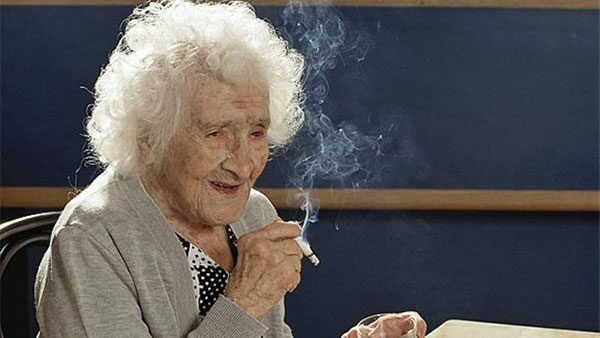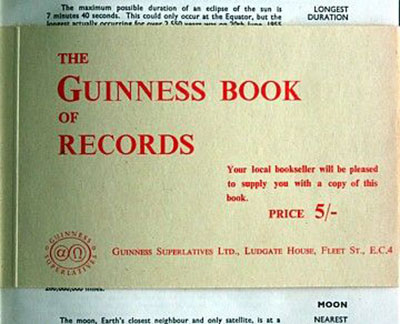I'm Older Than You'll Ever Be
Becoming the world's oldest person is an immensely tough job, but someone's got to do it. Meet the people who have managed to pull it off.
9%

The world's oldest-ever woman recorded an album when she was 121 years old
With apologies to Gertrude Weaver's family, she had a long way to go before she could call herself the next Jeanne Calment. The French woman, who lived to the age of 122, predated the Eiffel Tower, the telephone, movies, radio, and just about every other innovation that the 20th century was known for.
Born in 1875—and unlike many other claimants to the oldest person mantle, her birth was well-documented—Calment lived an incredibly full life, one that remained fairly active when most people were well past their prime. She rode a bike until age 100.
She met Vincent Van Gogh as a teenager. She outlived her daughter by more than 60 years, her husband by more than 50 years, and her only grandson by 37 years. She moved to a nursing home at age 90, handing off her home to a man who made an agreement to rent the property until she died. The landlord outlived her tenant.
She smoked most of her life, only stopping around the time she turned 120—and not because it was hurting her health, but because she could no longer see well enough to light the cigarettes on her own. She also ate a ton of chocolate, drank wine, and subsisted on plenty of olive oil.
And as her old age became something of legend, she became an in-demand pop culture icon of sorts. In 1990—leveraging her relative fame as the only person still alive who had met Vincent Van Gogh in person—she cameoed in a movie about the painter called Vincent and Me. And in 1996, she recorded an EP. No, really.
Calment's EP, Maîtresse du temps, included funk and rap tunes, according to the the French newspaper Liberation. In case you ever wanted to hear a song recorded by a woman who was born two years before Thomas Edison created the first record player, YouTube will hook you up.
"I've waited 110 years to be famous, I count on taking advantage of it," she said on the occasion of her 120th birthday party. She did just that until the day she died—August 4, 1997.
In the process, she raised the bar for old age.
"She was always a woman who fought. She was still sewing and weaving until about two years ago. She never ceased to be active, that's why we think she's lived so long."
— 43-year-old Miriam Alvear, discussing the long life of her grandmother. Leandra Becerra Lumbreras, who reportedly lived to be 127 years of age, before her death last month. Despite the claim, Guinness wouldn't verify Lumbreras' record because Lumbreras lost her birth records while moving 40 years ago—when Alvear was just three years old.

Why did a beer company get into the record-keeping business, anyway?
The Guinness Book of Records, later renamed Guinness World Records, was a proto-Wikipedia—a book that has details about the tallest women, the people who can bulge out their eyeballs the furthest, and people who are obsessed with having more records than anyone else.
But no record is perhaps as well-known as its list of the world's oldest person, which it goes to great lengths to verify.
"Guinness World Records is currently investigating and verifying potential successors for the oldest woman living title and will announce the new title holder in due course," the organization wrote after Gertrude Weaver died this week.
The question, of course, is: Why? Of all things for a beer company to create, why a book of records? Simple answer: Because there was a need for such a thing, and furthermore, it's the perfect thing to discuss at a bar.
Back in the early 1950s, Guinness managing director Hugh Beaver was out hunting when he got sucked into an argument about what the world's fastest bird might be. He realized that other people might have arguments like this one, especially at bars, and that a book covering the topics that might come up during such debates could come in handy. (This situation would never happen now, because we all have smartphones.)
Soon enough, the company had hired a couple of fact-finding experts, Norris and Ross McWhirter, to make the book. Starting from scratch was a challenge, but they had a strategy for that:
"When writing to an expert they did not ask for a direct bit of information, but stated a fact that they figured might be close enough to being right and asked the expert to correct it," a 1976 Guinness Magazine article explained. "'We found that people who have a total resistance to giving information often have an irresistible desire to correct other people's impressions.'"
It was, at first, supposed to be a piece of marketing for Guinness, but the first book, released in 1955, became so successful that they had to keep updating the dang book.
In the end, Guinness found itself making a book about random records for decades, and while we can't say it ever became more popular than the beer, it certainly put up some great competition. (Here's an irony about that: Despite being named for a beer, the book's creators eventually banned alcohol-related records from the book, meaning that this record will never be broken.)
The beer company no longer owns the book—it's now, fittingly, in the hands of the company that owns the Ripley empire—but it proves something that all marketing pros know well: Sometimes, the best ideas involve beer.
The idea that a company like Guinness created the official arbiter of who's older than anyone else is really bananas, if you think about it, almost as bananas as the idea that a 121-year-old woman can record an album.
And we bet you're wondering what we are—are there any other companies that just randomly tripped into left-field businesses? (Or you weren't—but now, you are.)
Next time, we'll talk about why a tire company reviews fancy restaurants, along with other examples of companies that found success in random places. Don't say we didn't warn you.
:format(jpeg)/2018/11/rwjlops3ir9gakacdkrq--1-.gif)
/2018/11/rwjlops3ir9gakacdkrq--1-.gif)

/uploads/ernie_crop.jpg)